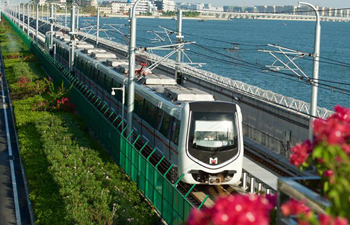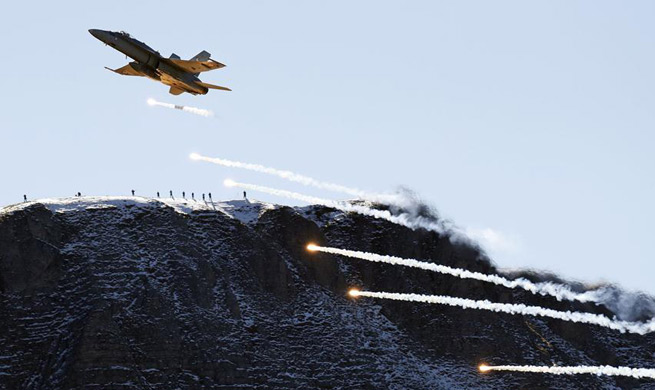TOKYO, Oct. 12 (Xinhua) -- Japanese Defense Minister Itsunori Onodera said on Thursday that the U.S. forces in Japan will ground all of its CH-53E helicopters following one of the transport choppers crash-landing near a U.S. base on the main island of Okinawa in Japan's southernmost prefecture.
The incident involved a CH-53E transport helicopter catching fire in midair during a training drill on Wednesday and bursting into flames as it made an emergency landing near the U.S. military's Northern Training Area, just 300 meters away from a residential area.
In a meeting in Tokyo between Onodera and Maj. Gen. Charles Chiarotti, deputy commander of U.S. Forces Japan, Onodera said the incident was "deplorable and had caused considerable anxiety among the residents living nearby and other people in the prefecture."
Chiarotti, for his part, said that as well as grounding the choppers, he would consider measures to prevent further such incidents.
Meanwhile, Okinawa Gov. Takeshi Onaga, a staunch proponent of lessening the U.S. base hosting burdens of the residents of Okinawa, described the incident in the village of Higashi in Okinawa as "horrible."
"I felt disconcerted at seeing the sudden change from ordinary life to this horrible situation. I feel sad," Onaga told local media.
According to informed sources here, the U.S. Naval Safety Center has rated the accident as the most serious "Class A." It said that a fire broke out in the helicopter's engine, which forced it to make crash-landing.
The CH-53E helicopter belongs to the controversial Marine Corps Air Station Futenma in Japan's southernmost prefecture of Okinawa.
The base is central to a relocation spat between the local and central governments.
Okinawan officials and residents want to see the base relocated outside the prefecture, whereas the central government maintains that relocating it to a coastal region within Okinawa remains the only solution.
As well as hosting the bulk of U.S. military forces, Okinawans have had to endure numerous accidents involving U.S. military aircraft, which has, along with crimes committed by U.S. military and affiliated personnel, led to anti-U.S. sentiment rising on the tiny sub-tropical island.
In September, a controversial tilt-rotor engine Osprey aircraft developed engine trouble and made an emergency landing at New Ishigaki Airport in Okinawa and in December last year, an Osprey crash-landed off the city of Nago, also in Okinawa.
In August 2015, a UH-60 helicopter crashed near Uruma City during an exercise after taking off from the U.S. Kadena Air Base. Seven people, including two from Japan's Self-Defense Force (SDF), were injured.
Prior to that, in August 2013, an HH-60 helicopter from Kadena crashed in the U.S. Camp Hansen compound, killing one crew member.
In August 2004, local fears of U.S. military aircraft reached a fever pitch when A CH-53 helicopter plowed into the grounds of Okinawa International University, injuring 3 crew members and damaging the university buildings and nearby houses.
According to the Okinawa Prefectural Government website, 15 helicopter accidents occurred between 1973 and 1999, and between 1973 and 2002 the number of fixed-wing U.S. military aircraft accidents totaled 25, Japan's public broadcaster NHK reported recently.
Prime Minister Shinzo Abe has ordered the defense ministry and SDF to probe the cause of the latest U.S. military-linked accident and not rely only on U.S. investigations, a senior government official was quoted as saying Thursday.
The Okinawa prefectural government, for its part, has said that it was attempting to conduct vital environmental tests following the crash on Wednesday night at the accident site, as it suspected the chopper involved may have been equipped with a safety device that contained a low-level radioactive isotope.
The local government in Okinawa said that it was denied access to the crash site by the the U.S. military, adding to consternation on the island.
Meanwhile, local police in Okinawa dispatched investigators to the site, as the incident may have been a violation of a Japanese law on endangering aviation, informed sources said Thursday.
But investigations by Japanese authorities into the crash and potential leaking of low-level radiation, may be hampered, as U.S. military hardware and assets cannot be searched or seized due to the Japan-U.S. status of forces agreement (SOFA).















